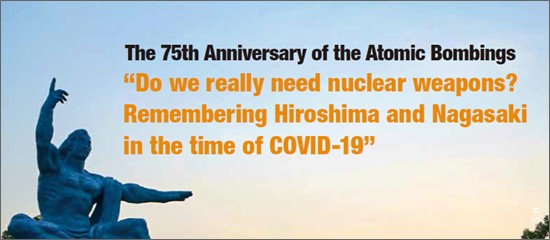Protect all
humanity by ratifying the nuclear weapon ban treaty

Joint statement of Philippine Red
Cross and International Committee of the Red Cross on the 75th
anniversary of the Hiroshima and Nagasaki blasts
August 9, 2020
On this day 75 years ago,
an entirely new type of weapon exploded above the Japanese city of
Hiroshima. Within a fraction of a second, a massive dome of fire
filled the sky. The intense heat of the explosion eclipsed the
center of the coastal city, immediately vaporizing all living
things. A millisecond later, a violent supersonic blast wave
expanded outwards from the fireball in all directions, levelling
most of the city and its 340,000 inhabitants to the ground.
A few weeks later, Fritz Bilfinger, a delegate of the International
Committee of the Red Cross (ICRC), arrived in Hiroshima to assess
the damage. The telegram he sent back to his colleagues in Tokyo
painted a chilling picture: “city wiped out; eighty percent all
hospitals destroyed or seriously damaged; inspected two emergency
hospitals, conditions beyond description, full stop; effects of bomb
mysteriously serious, stop.”
It would later emerge that the explosion had instantly killed tens
of thousands of people and inflicted unspeakable suffering upon many
others. Three days after the bombing of Hiroshima, on 9 August 1945,
the new weapon would again unleash its terrifying power, this time
to kill and injure 60 per cent of the population of Nagasaki,
another Japanese city.
In the following months and years, despite the best efforts of the
ICRC and the Japanese Red Cross Society to assist the victims, tens
of thousands more would die from the bombs’ long-lasting effects.
Disturbingly, the explosion has continued to kill and injure up
until this day, each year causing cancers and other deadly illnesses
in those who found themselves in its vicinity.
Throughout history, the international community has taken decisive
action to prohibit and eliminate weapons that have unacceptable
humanitarian consequences. The unspeakable suffering and devastation
witnessed in Hiroshima and Nagasaki led the ICRC and the wider Red
Cross and Red Crescent Movement to advocate that nuclear weapons
must never be used again and prohibited under international law. The
Senate of the Philippines, through the efforts of the undersigned
Richard Gordon, adopted Senate Resolution No. 47 in 2017 expressing
full support to the Red Cross and Red Crescent Movement’s call to
ban and eliminate nuclear weapons.
In 2017, 122 States including the Philippines responded to the
evidence of the immense suffering resulting from any use of nuclear
weapons by adopting the landmark Treaty on the Prohibition of
Nuclear Weapons (TPNW). The TPNW includes a comprehensive set of
prohibitions on participating in any nuclear weapons activities,
including developing, testing, producing, using or threatening to
use them. Three years later, this treaty needs an additional 10
ratifications to enter into force.
But why is such a treaty needed, 75 years after the atomic bombings
of Hiroshima and Nagasaki? This is because there are still nearly
14,000 nuclear weapons in the world, thousands of which are at
“hair-trigger” alert, ready to be launched at a moment’s notice.
The use of even a fraction of these weapons would cause long-term
and irreversible effects on human health, the environment, the
climate and food-production – that is, everything that life depends
on – threatening future generations and the very survival of
humanity.
Any use of nuclear weapons would generate colossal humanitarian
needs that no government or international organization has the
capacity to respond to. Who, then, will assist the victims of a
nuclear explosion, and how? What we cannot prepare for, we must
prevent.
Last year, the 70th anniversary of the Geneva Conventions, the
foundational instruments of international humanitarian law (IHL),
provided a forceful reminder that even wars have limits. Military
needs can never justify using inhumane or indiscriminate weapons.
There is little doubt that adherence to the TPNW will help protect
future generations and be a turning point in our efforts to end the
era of nuclear weapons. The Philippines can play a leading role in
achieving this goal.
By signing the treaty in 2017, the Philippines became one of the
flagbearers for this important convention. In now joining a growing
number of states in ratifying the TPNW, the Philippines can increase
the chances of the treaty coming into force, thereby honoring the
memory of the hundreds of thousands of victims of Hiroshima and
Nagasaki.
Sen. Richard J. Gordon
Chairman and CEO
Philippine Red Cross
Boris Michel
Head of Delegation
ICRC Philippines